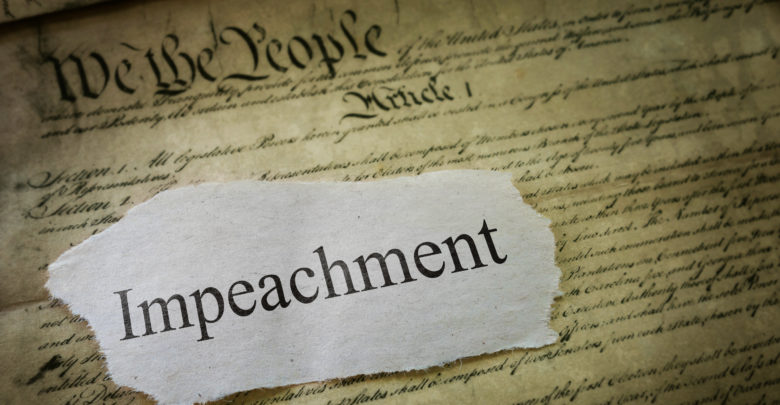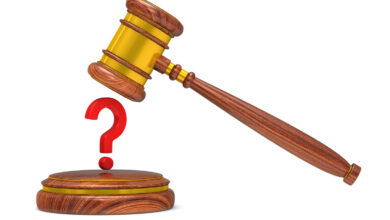To Impeach or Not to Impeach

Right now, only political calculation stands in the way of the House launching impeachment proceedings against President Trump.
The political calculus is straightforward. Starting impeachment proceedings now, the thinking goes, would play into the Trump/GOP narrative of “presidential harassment,” and risk alienating independents and moderates who want to see Congress attend to the people’s business, not waste time pursuing a political vendetta against the President.
That political calculus is neither entirely inaccurate nor inappropriate.
There is widespread agreement among politicians and political commentators alike that the premature launching of impeachment proceedings would, in fact, turn off a large number of voters. Maybe even enough to make the difference in the 2020 presidential election. When Nancy Pelosi says, “I’m not for impeachment,” she isn’t being a wimp or a coward. She is being a realist, guided by her clear-eyed assessment of the political environment in the country.
And it is no transgression to be guided, at least in large part, by political calculation in what is, after all, a political process.
But political calculation always needs to be weighed against what is being sacrificed in its name. In this case, what is being sacrificed is insuring that a dangerous, corrupt, and incompetent president remains in office for another two years.
So far, the Democrats’ political decision to consign impeachment to the back burner has yielded some positive results. The Democratic takeover of the House in the 2018 election is widely viewed as a result of keeping the focus more on bread-and-butter issues like health care than on impeachment.
Despite the results of the 2018 election, however, the Democratic strategy toward impeachment has been far from flawless.
The “let’s wait for the Mueller Report” mantra has been a disaster. Maybe the release of the full Mueller Report, if it ever happens, will change that. But as of now, the “wait for Mueller” strategy has backfired. It put all the impeachment eggs in the Russia basket, and largely ignored Trump’s far more easily provable transgressions. The Russia scandal has created a kind of political black hole, rendering everything else in its vicinity invisible.
The great irony here, of course, is that the Russia scandal, rather than leading to Trump’s removal of office, has actually shielded Trump from impeachment by taking away the focus on everything else.
So let’s start looking at “everything else.”
The grounds for impeachment are set out in 8 words in the United States Constitution: “Treason, Bribery, or other High Crimes and Misdemeanors.” Unless the Mueller Report says something wildly inconsistent with Attorney General Barr’s report on its “principal conclusions,” we should probably take treason and bribery off the table, at least for now.
That leaves “high crimes and misdemeanors.”
The Constitution doesn’t define this phrase, and countless articles have been written about its meaning.
There is more or less consensus that the phrase “high crimes” doesn’t mean “serious” or “bad” crimes, it means actions by people in a unique position of authority with special duties deriving from an oath of office.
In its comprehensive 1974 Report on the “Constitutional Grounds for Presidential Impeachment,” the House Judiciary Committee concluded that each of the 13 American impeachments to that date (one President, one Senator, one Secretary of War, and ten judges) involved charges of “misconduct incompatible with the official position of the officeholder.” The conduct leading to impeachment fell into three categories:
“(1) exceeding the constitutional bounds of the powers of the office in derogation of the powers of another branch of government; (2) behaving in a manner grossly incompatible with the proper function and purpose of the office; and (3) employing the power of the office for an improper purpose or for personal gain.”
The Report found that in drawing up articles of impeachment, the House “placed little emphasis on criminal conduct.” Instead, most impeachment articles alleged that the officer “violated his duties or his oath or seriously undermined public confidence in his ability to perform his official functions.” Of the 13 impeachments voted by the House as of 1974, at least 10 involved non-criminal allegations: “The purpose of impeachment is not personal punishment; its function is primarily to maintain constitutional government. . . . In an impeachment proceeding a President is called to account for abusing powers that only a President possesses.”
As of today, Articles of Impeachment have been brought against three American presidents, Andrew Johnson, Richard Nixon and Bill Clinton. The charges against all three are consistent with the 1974 Judiciary Committee Report, alleging violations of the presidential oath of office and failure to take care that the laws be faithfully executed, not indictable violations of criminal laws.
Johnson’s “high crimes” included the removal of the Secretary of State and the appointment of a successor without the advice and consent of the Senate, attempting to ridicule and disgrace Congress, and failing to execute elements of the Tenure of Office Act enacted by Congress. The Nixon Articles cited Nixon’s actions to impede the investigation of the Watergate burglary, misusing executive power for political purposes, and refusing to produce materials demanded by congressional subpoenas. Clinton was impeached for perjurious testimony about his sexual relationship with Monica Lewinski, corruptly attempting to influence the testimony of others about that relationship, and obstructing the administration of justice by concealing evidence related to the civil sexual harassment action brought against him by Paula Jones.
We don’t need the Mueller Report to know that President Trump’s actions more than meet the “high crimes” standards established by the precedent set by the impeachment articles drafted against the three previous presidents. Here are just a few of Trump’s high crimes that are far more serious than anything included in the Articles of Impeachment for Johnson, Nixon and Clinton:
- Obstruction of the Mueller investigation by lying and encouraging others to lie about the purpose and nature of the Trump Tower meeting to obtain illegally hacked Russian government dirt on Hillary Clinton;
- Obstruction by dangling pardons in order to influence witnesses not to testify;
- Obstruction by openly encouraging witnesses not to cooperate with the FBI and government investigators, and praising those who refused to do so;
- Ordering Customs and Border Control officers to disobey the law and refuse to admit asylum seekers, who have a statutory right of entry;
- Abusing his power by threatening regulatory action to retaliate against news outlets who are critical of him, including opposition of the merger of CNN’s parent Time Warner with AT&T, and calling for government review of Amazon’s shipping rates;
- Abusing his power by pressuring the Department of Justice and the FBI to investigate his political adversaries, including Hillary Clinton;
- Decimating the Department of Homeland Security and other government agencies to the point that they cannot perform their functions;
- Using “acting” titles for government officials in order to circumvent the Senate’s advice and consent function;
- Ordering the United States military to do police work on the Mexican border, in contravention of the Posse Comitatus Act;
- Profiting from the presidency by refusing to divest his business interests.
The list could go on, without even taking into account Trump’s more mundane alleged crimes like attempting to secure loans and insurance by giving false financial information to banks and insurers, conspiring to violate campaign finance laws by paying and covering up hush-money payments, and treating the supposedly charitable Trump Foundation, in the words of the New York State Attorney General, as “little more than an empty shell” used not for charitable purposes, but “to pay off the legal obligations of entities he controlled, to promote Trump hotels, and to support his presidential election campaign.”
Letting all of this pass in order to avoid the potential political disadvantage of being viewed as presidential harassers is a steep price to pay. Maybe too steep, especially in light of the fact that showing restraint now will not necessarily prevent Trump’s reelection.
Think about it. By ignoring compelling grounds for impeachment, we may get not only four more years of Trump, but also a precedent for a nearly unreachable standard of impeachment for the future.





All true, however…On the one hand, do we really want Pence to replace Trump and then to have Pence run for office as the sitting President? On the other hand, maybe it is better to make sure all the evidence is made public so that it can be used against Trump when he runs for re-election – as he surely will. My trouble is that I can’t decide if the problem is that we have two good choices or two bad choices.
Yep, none of this is clear or free of risk.
Vice President pence would not be my first choice. However that’s not the point, the point is to preserve the fact there is constitutionally a line a president could cross and lose his job. Effectively to be too afraid to impeach would remove impeachment as a viable blockade against grossly improper performance of any future president. where the GOP concluded President Clinton’s behavior exceeded that lying in the sand certainly President Trump has grossly exceeded that line in the sand. My contention is the House cannot afford not to impeach.
Quite helpful. The political calculus seems to be that (a) if the Senate acquits, Trump or his base will thirst for revenge; (b) if the Senate convicts, we’ll have a President Pence, who might have a better chance at reëlection. But failing to try at this point would abet the destruction of constitutional government.
Some Democrats took a wrong turn in 1974, believing deep down that their policy positions were unpopular nationally and that they needed to rely on extrapolitical processes to bring down Nixon (and, some hoped, Reagan over Iran-Contra). That’s the Al Capone theory — if you can’t get him on murder, get him on tax evasion, but put him behind bars. Republicans lost in trying to turn this theory to their advantage with the Clinton impeachment. But Trump is different. He doesn’t see the handwriting on the wall as Nixon did. All he’s interested in is how far he can go without going to prison. He could have been sent to oblivion early on, if he hadn’t been able to buy the Roosevelt Hotel in midtown and put his own name on it. Whoever let him do that did the world a disservice. House Democrats should not do the same out of a misplaced political judgment.
Several readers have observed that right now there’s no way that Republican senators will provide the 2/3 vote needed to convict, and that impeaching without convicting could enhance Trump’s chances in 2020. The first point is undoubtedly correct, but there’s never going to be a time when GOP senators will support removal at the very beginning of the process. The only way that can happen is if impeachment proceedings in the House reveal sufficient evidence of wrongdoing to sway public opinion enough to force GOP senators on board. I’m not sure about the second point. Too much is made of the Clinton analogy, but the circumstances are entirely different now. Clinton was impeached for lying about sex. Most people thought those charges weren’t impeachable offenses. If impeachment hearings against Trump show a broad array of impeachable conduct and the GOP refuses to recognize the truth, that could cut the other way. But there are risks on every side of this.
Pence is carrying a lot of baggage. If Congress can get enough public support during impeachment hearings wouldn’t Pence be held accountable for being his “puppy dog”? (Sorry puppies) His crimes are worse. He made a choice! So how does it work? Trump- Pence -Pelosi? A citizen can dream.
The choice NOT to start impeachment proceedings could potentially cause a great rift within the Democratic party itself, and, if further aggravated by Russian interference, could damage its political success in 2020. If impeachment hearings are opened, all that damaging evidence (and don’t forget the Butina – NRA – Republican Party entanglements) would act to solidify public sentiment loudly and wholly against Trump — even if the actual proceedings did not conclude with a formal impeachment decision by the Senate.